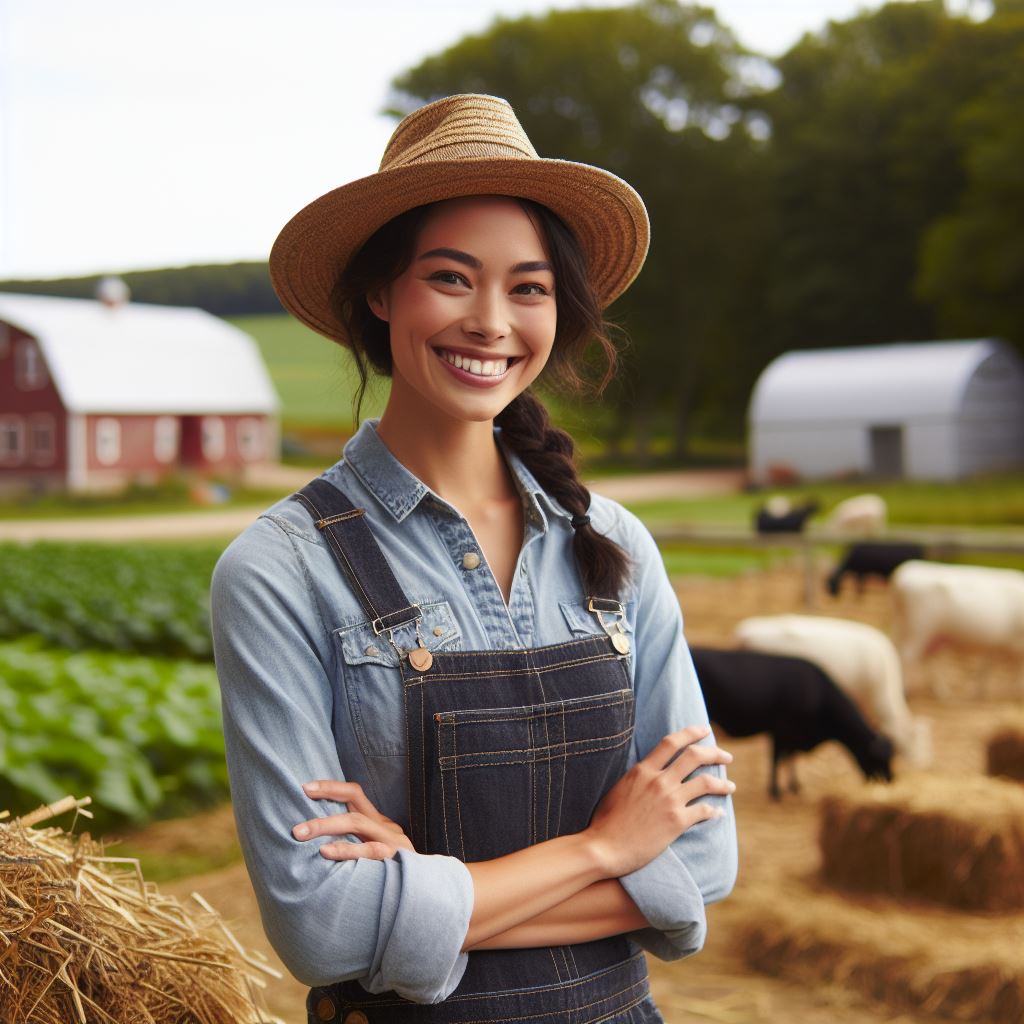Introduction
In recent years, there’s been a noticeable shift as more women trade bustling city life for tranquil farm living.
This trend reflects a desire for connection to nature, sustainable living, and a slower pace.
The purpose of this blog post is to delve into the experiences of these women.
We aim to share their tales to inspire others who may be considering a similar journey.
Through their stories, we’ll uncover the challenges they faced, the joys they discovered, and the lessons they learned along the way.
From the initial decision to leave urban settings behind to the practicalities of starting a farm, each woman’s journey is unique and enlightening.
We’ll explore how they adapted to rural life, built communities, and found fulfillment in working the land.
Additionally, we’ll discuss the economic aspects of farm living and the role of technology in modern agriculture.
Ultimately, this blog post serves as a platform for these women to share their wisdom, providing valuable insights for those embarking on a similar path.
Join us as we celebrate the resilience, creativity, and passion of women embracing farm life.
Read: Doctor to Dairy Medico Agri Adventure
Reasons for Transitioning
A. Desire for a simpler, more sustainable lifestyle
Transitioning from city life to farm living is a significant decision that many women have made in recent years.
The appeal of a simpler, more sustainable lifestyle has played a crucial role in this transition.
Living closer to nature and growing their own food has proven to be highly desirable for these women.
Living in the city, one can feel disconnected from nature, constantly surrounded by concrete structures and artificial environments.
On the contrary, living on a farm allows women to experience the beauty of nature firsthand.
The ability to grow their own food brings a sense of satisfaction and fulfillment, knowing exactly where their food comes from and the effort it takes to produce it.
Furthermore, the environmental impact of city living has become increasingly apparent.
Women have become more aware of the negative effects that cities have on the environment, such as pollution and waste production.
By transitioning to farm living, they are actively choosing a more sustainable lifestyle.
They can minimize their carbon footprint, reduce waste, and practice eco-friendly farming methods.
B. Seeking a stronger connection to food and its sources
Another crucial reason for this transition is the desire for a stronger connection to food and its sources.
In today’s world, where processed and convenience foods dominate the market, knowing the origin and quality of our food has become essential.
By living on a farm, women are actively involved in the production process.
They can grow their own fruits, vegetables, and even raise animals for dairy or meat.
This connection to food allows them to have greater control over what they consume, leading to better overall health and well-being.
Farm living also offers numerous benefits in terms of organic and healthy food options.
The use of pesticides and chemicals is minimized, if not eliminated completely, on organic farms.
This means that women can have access to fresh, pesticide-free produce and enjoy the health benefits associated with it.
Additionally, farm living provides an opportunity to engage in sustainable farming practices, such as composting and using natural fertilizers, which further contribute to a healthier food ecosystem.
C. Escaping the stress and fast-paced nature of city life
Escaping the stress and fast-paced nature of city life is another driving force behind this transition.
Living on a farm allows women to embrace a slower pace of life.
The daily chores and responsibilities on a farm require patience and careful planning, allowing individuals to savor each moment.
This slower living reduces work-related stress and promotes a healthier work-life balance.
Being surrounded by nature also has numerous therapeutic benefits.
Studies have shown that spending time in nature can reduce anxiety, improve mental health, and increase overall well-being.
The tranquility and peace that come from being in nature are invaluable and provide a much-needed break from the hustle and bustle of city life.
In fact, the reasons for transitioning from city life to farm living for women are diverse.
The desire for a simpler, more sustainable lifestyle, a stronger connection to food and its sources, and escaping the stress and fast-paced nature of city life are all significant factors.
By choosing farm living, women can experience the beauty of nature, have control over their food sources, and enjoy a slower and more fulfilling way of life.
Read: Lawyer to Livestock: Unconventional Farm Starts
Challenges Faced by Women
In the journey from city life to farm living, women face numerous challenges that require immense strength and resilience.
This section explores the obstacles encountered by women and how they overcome them to thrive in the agricultural world.
A. Physical demands of farm work
- Farm work comes with physical labor that tests the endurance and stamina of women.
The long hours, repetitive tasks, and heavy lifting can be strenuous on the body.
Women need to understand the physical demands involved and make necessary adjustments to prevent burnout and injuries. - Despite the demanding nature of farm work, women have shown remarkable strength-building and adaptability.
Many engage in regular exercise routines, such as weightlifting and cardiovascular activities, to build the physical stamina required for farming.
Additionally, they utilize techniques like proper body mechanics and ergonomics to minimize strain and maximize efficiency in their tasks.
B. Gender stereotypes and societal expectations
- Throughout history, farming has been portrayed as a male-dominated industry, reinforcing gender stereotypes.
Women faced limited opportunities and were often excluded from owning or managing farms.
The perception that farming is solely a man’s role creates additional hurdles for women entering the agricultural sector. - However, women have been breaking these gender stereotypes and challenging societal expectations through their experiences in farm living.
They prove that they can match and even surpass the skills and knowledge traditionally associated with men.
Women actively participate in every aspect of farming, from animal husbandry to crop cultivation, proving their competence and dedication.
C. Balancing personal life and farm responsibilities
- Juggling farm work alongside family, relationships, and personal time is undoubtedly a complex task for women.
The demanding nature of farm responsibilities often requires long hours and limited flexibility, making it challenging to maintain a balanced personal life. - Despite the challenges, women have found strategies and perspectives that enable them to strike a meaningful balance.
They prioritize communication, ensuring clear expectations and support from their loved ones.
Additionally, they embrace time management techniques that allow them to allocate dedicated personal time while efficiently fulfilling farm responsibilities.
In short, women embarking on the journey from city life to farm living face physical, societal, and personal challenges.
Yet, through strength-building, breaking gender stereotypes, and finding balance, they conquer these obstacles and thrive in the farm industry.
Their determination and perseverance continue to inspire and pave the way for future generations of women in agriculture.
Read: Silicon Valley to Vineyards: Techies Turn Farmers

You Might Also Like: Vertical Farming: A High-Rise Harvest
Transform Your Agribusiness
Unlock your farm's potential with expert advice tailored to your needs. Get actionable steps that drive real results.
Get StartedSuccess Stories and Inspiring Experiences
A. Real-Life Success Stories of Women Transitioning to Farm Living
- Meet Sarah, a city dweller turned organic farmer who found her motivation in reconnecting with nature and sustainable practices.
- Jessica faced challenges in adjusting to farm life, but her determination led her to successfully start a thriving flower business.
- Highlighting Emma’s journey from a hectic corporate job to running a community-supported agriculture (CSA) farm, finding true fulfillment in feeding her community.
- Share Martha’s story of leaving the comforts of urban life to become a homesteader, finding peace and purpose in a simpler lifestyle.
- Meet Lily, who overcame initial skepticism and learned the ropes of dairy farming to become a successful goat milk producer.
These inspiring women faced various challenges during their transition to farm living.
B. Motivations, Challenges Faced, and Ultimate Fulfillment
Each woman had unique motivations that played a vital role in their transition:
- Sarah’s love for the environment and desire to promote sustainability.
- Jessica’s passion for flowers and her dream of running her own flower farm.
- Emma’s drive to provide healthy, locally-grown food to her community.
- Martha’s longing for a slower-paced lifestyle and connection with nature.
- Lily’s interest in self-sufficiency and passion for goat farming.
Despite numerous challenges faced, these women persevered and found ultimate fulfillment:
- Sarah embraced the hard work and saw her farm flourish, knowing she was making a positive impact.
- Jessica’s determination paid off as her flower business gained recognition and brought joy to countless customers.
- Emma’s CSA farm thrived, providing fresh and healthy produce to grateful members of the community.
- Martha found peace and serenity in her surroundings, appreciating the wonders of nature in her daily life.
- Lily successfully established a loyal customer base for her goat milk products and inspired others to pursue farming.
C. Anecdotes and Experiences to Inspire Readers
Sharing each woman’s personal anecdotes and experiences can inspire readers considering a similar transition:
- Sarah recalls the moment she harvested her first organic crops, feeling a deep connection to the land.
- Jessica shares the joy she experienced when customers visited her flower farm, admiring her beautiful blooms.
- Emma reminisces about the gratitude expressed by her CSA members, making every ounce of hard work worth it.
- Martha writes about the tranquility she found in the simplicity of her new lifestyle, away from the hustle and bustle.
- Lily reflects on the bond that formed between her and her goats, the source of her nourishment and livelihood.
D. Tips and Advice for Women Considering a Move to Farm Living
For women intrigued by farm living, offering practical tips and advice can be invaluable:
- Encourage them to thoroughly research resources, such as books, workshops, and online courses, to gain knowledge.
- Highlight the significance of joining communities and networks where they can find support, advice, and camaraderie.
- Discuss the importance of building relationships with local farmers and seeking mentorship opportunities.
- Offer tips on finding suitable land, considering factors like soil quality, water access, and proximity to markets.
- Encourage them to start small, gradually expanding their farm operations as they grow more confident and experienced.
By providing these tips, women can feel empowered and equipped to make their dream of farm living a reality.
Read: Urban to Rural Shift: First-Gen Farmer Diaries
Conclusion
As we conclude this section, we are reminded of the incredible strength and determination of these women.
They have chosen to step outside of their comfort zones and embrace a different way of living. In doing so, they have found a deep sense of empowerment and fulfillment that many of us strive for.
The main points covered in this blog post highlighted the challenges faced by women transitioning from city life to farm living.
We learned about the practical skills they acquired, the connection with nature they established, and the sense of community they found.
All of these elements contribute to their overall empowerment and sense of fulfillment.
Through their stories, we are encouraged to consider our own desires for a simpler, more sustainable lifestyle.
The experiences shared by these women remind us of the importance of living in harmony with nature and the joy that can be found in working the land.
So, as you continue to read and reflect on their tales, we encourage you to explore your own aspirations for a simpler, more sustainable lifestyle.
Whether it be starting a backyard garden, joining a local community-supported agriculture program, or even considering a move to the countryside, take a moment to connect with your own desires and dreams.
In closing, the transition from city life to farm living has brought empowerment and fulfillment to these women, and it serves as a reminder for us to live more intentionally and harmoniously with the world around us.




